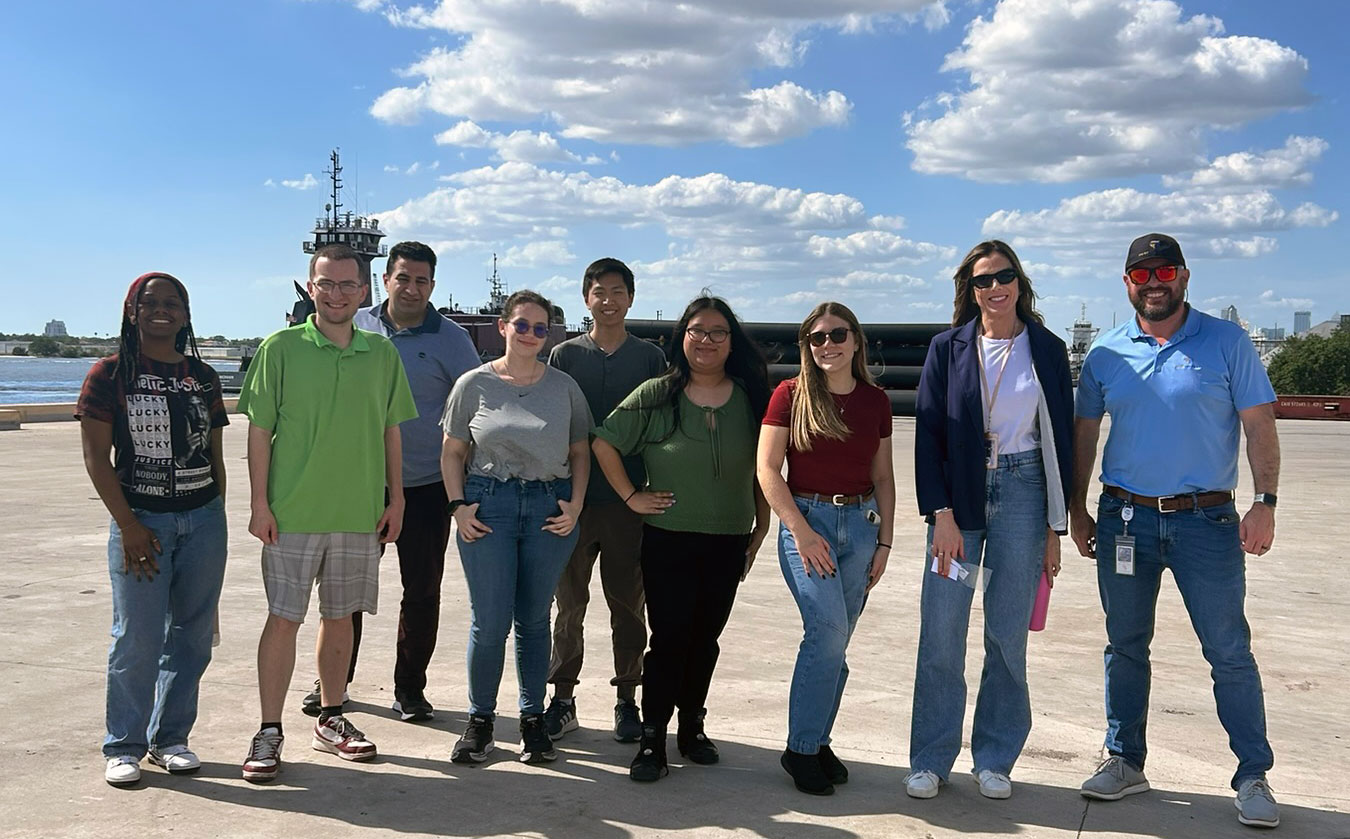
A group of Florida Polytechnic University students recently visited Port Tampa Bay for a close-up look at the port’s operations. Pictured from left are Donasia Washington, Noah Young, Vahid Hatampour, Hailey Bauer, Nolan Nguyen, Jessica Quang, Catarina Andrade, Dr. Beatriz Canamary, adjunct professor in the Department of Data Science and Business Analytics at Florida Poly, and Jose de Jesus, director of engineering at Port Tampa Bay.
Florida Polytechnic University students pursuing careers in logistics and supply chain management often secure vital positions improving warehouse, distribution, transportation and inventory processes for companies of all sizes around the world.
The reality of these careers came into sharp focus recently for a group of logistics and sustainability students who received a private, behind-the-scenes tour of Port Tampa Bay, Florida’s largest and most cargo-diverse seaport. A 2024 study showed the port has a $34.6 billion economic impact on the region, supporting more than 192,000 jobs.
“For students to truly understand how the business world operates, it’s important they see real-world applications in action,” said Dr. Beatriz Canamary, adjunct professor in the Department of Data Science and Business Analytics at Florida Poly. “It’s incredibly rewarding to watch how these experiences deepen their knowledge and expand their perspective.”
Canamary’s Florida Poly logistics and sustainability course teaches students to evaluate and enhance logistics operations while aligning them with broader economic and environmental goals. For their final project, students must analyze a port-related company within the port ecosystem, identify key challenges, and propose circular economy strategies focused on reducing waste and maximizing material reuse.
“A circular economy is essential in today's world – especially in manufacturing and supply chain sectors – because it emphasizes reusing and repurposing existing resources,” she said. “It’s not just about reducing waste; it’s about protecting natural resources, driving innovation through the smarter use of materials, and contributing to long-term supply chain resilience.”
The visit to the Tampa Bay port was eye-opening for students, Canamary said.
Among the day’s discussions was a conversation with a professional who operates refrigerated cargo explaining the process of bringing fruit from the Caribbean to Florida.
“They were so surprised and fascinated,” said Canamary, who has deep experience in the logistics and supply chain industry with expertise in maritime logistics and sustainability. “He told them that now every time they eat a banana, they will know how the banana got to their table and all the processes and issues they face to make it happen.”
Catarina Andrade, a senior majoring in mechanical engineering, said the port visit provided important insight for her team’s final project.
“It allowed us to directly explore the real-world challenges and opportunities facing ports today,” she said. “I specifically asked about the potential implementation of onshore power supply (OPS), a system that allows ships to plug into shore-side electricity while docked, eliminating the need to run diesel engines and thereby reducing emissions.”
The students learned that high costs and the need to retrofit existing vessels are current barriers to OPS implementation, she said.
Andrade and her team will present their final project, titled “Optimizing Circular Economy Strategies for Sustainable Maritime Logistics: A Case Study on VINCI Energies and Port Tampa Bay,” at this June’s prestigious North American Conference on Industrial Engineering and Operations Management to be co-hosted by Florida Poly in Orlando.
Contact:
Lydia Guzmán
Director of Communications
863-874-8557